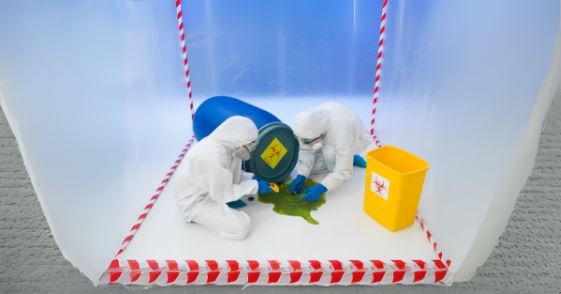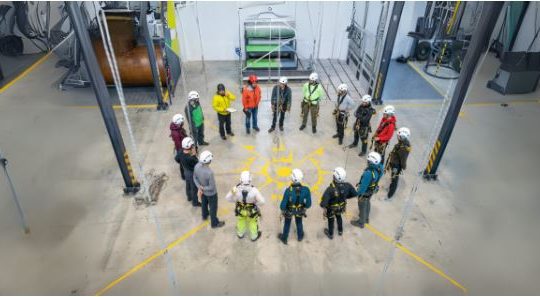
Level 3 Award in Advanced Chemical Risk Control
Course Overview:
The Level 3 Award in Advanced Chemical Risk Control equips participants with the knowledge and skills needed to effectively manage chemical risks in the workplace. This advanced-level course is designed for supervisors, managers, and safety professionals who oversee chemical safety programs. The training emphasizes the identification, evaluation, and control of chemical hazards, ensuring compliance with regulatory standards while safeguarding employees and the environment.
Benefits:
- Enhanced Expertise: Develop a thorough understanding of chemical safety management.
- Regulatory Compliance: Ensure adherence to national and international safety regulations.
- Improved Risk Mitigation: Learn advanced strategies to minimize exposure and accidents.
- Leadership Skills: Gain the ability to lead teams and implement workplace safety improvements.
- Career Advancement: Boost qualifications for senior health and safety roles.
Learning Outcomes:
Upon completion of this course, participants will:
- Identify and evaluate chemical hazards in the workplace.
- Understand chemical classifications, labeling, and Safety Data Sheets (SDS).
- Conduct thorough chemical risk assessments and implement control measures.
- Develop policies and procedures for safe chemical handling, storage, and disposal.
- Ensure compliance with chemical safety regulations and standards.
- Lead incident response and crisis management for chemical emergencies.
- Monitor and review workplace safety programs for continuous improvement.
Study Units:
- Introduction to Advanced Chemical Risk Control
- Overview of chemical hazards and workplace implications.
- Legal and regulatory requirements for chemical safety.
- Chemical Classification and Hazard Identification
- Understanding chemical properties and hazard categories.
- Interpreting Safety Data Sheets (SDS) and Globally Harmonized System (GHS) labeling.
- Chemical Risk Assessment Techniques
- Conducting detailed chemical risk assessments.
- Assessing exposure routes and potential health effects.
- Control Measures for Chemical Hazards
- Implementing hierarchy of controls: elimination, substitution, engineering, and administrative measures.
- Effective use and maintenance of personal protective equipment (PPE).
- Chemical Storage and Handling Protocols
- Best practices for storing, handling, and transporting chemicals.
- Spill management and emergency response procedures.
- Regulatory Compliance and Documentation
- Ensuring compliance with national and international chemical safety regulations.
- Record-keeping and reporting requirements.
- Incident Management and Crisis Response
- Preparing for and responding to chemical emergencies.
- Coordinating with emergency services and regulatory bodies.
- Continuous Improvement in Chemical Safety
- Monitoring and evaluating safety programs.
- Incorporating feedback and updates into chemical risk control strategies.
Career Progression:
Completing the Level 3 Award in Advanced Chemical Risk Control prepares participants for senior roles, such as:
- Chemical Safety Manager: Oversee safety protocols for chemical handling and risk mitigation.
- Health and Safety Specialist: Focus on advanced chemical risk assessments and safety planning.
- Compliance Officer: Ensure organizational adherence to chemical safety regulations.
- Risk Management Consultant: Provide expert guidance on chemical safety strategies.
- Training Coordinator: Design and deliver chemical safety training programs for employees.
Our assessment process is designed to ensure every learner achieves the required level of knowledge, skills, and understanding outlined in each course unit.
Purpose of Assessment
Assessment helps measure how well a learner has met the learning outcomes. It ensures consistency, quality, and fairness across all learners.
What Learners Need to Do
Learners must provide clear evidence that shows they have met all the learning outcomes and assessment criteria for each unit. This evidence can take different forms depending on the course and type of learning.
Types of Acceptable Evidence
Assignments, reports, or projects
Worksheets or written tasks
Portfolios of practical work
Answers to oral or written questions
Test or exam papers
Understanding the Structure
Learning outcomes explain what learners should know, understand, or be able to do.
Assessment criteria set the standard learners must meet to achieve each learning outcome.
Assessment Guidelines
All assessment must be authentic, current, and relevant to the unit.
Evidence must match each assessment criterion clearly.
Plagiarism or copied work is not accepted.
All learners must complete assessments within the given timelines.
Where applicable, assessments may be reviewed or verified by internal or external quality assurers.
Full learning outcomes and assessment criteria for each qualification are available from page 8 of the course handbook.
Top Courses
No results found.
Related Courses
Let's Get in touch
Deleting Course Review
Course Access
This course is password protected. To access it please enter your password below:



